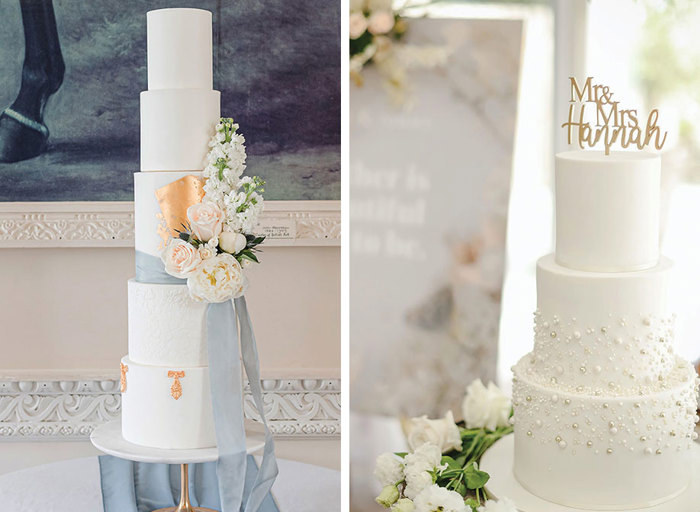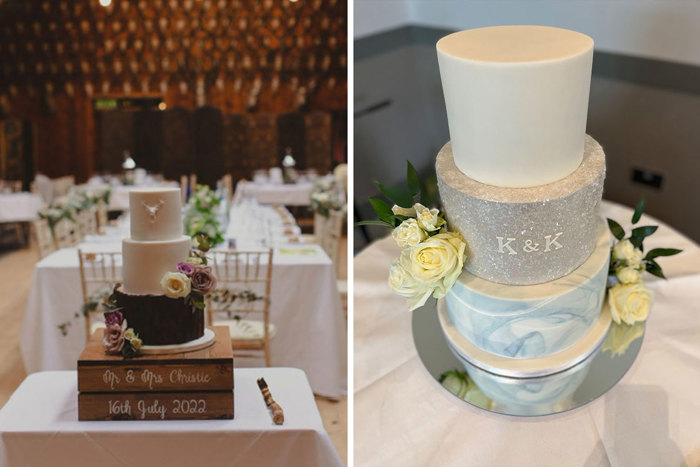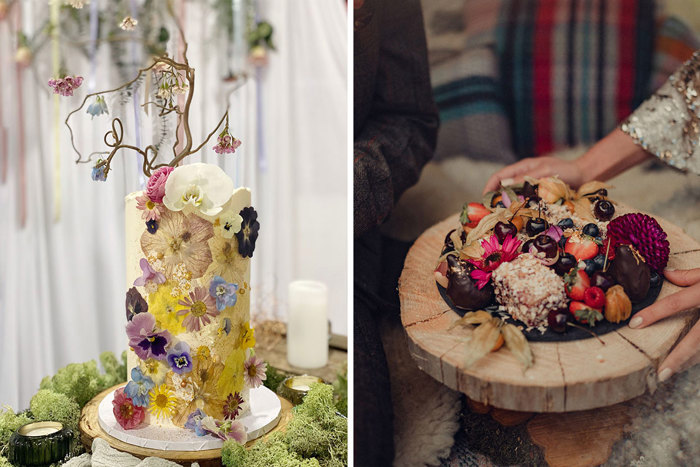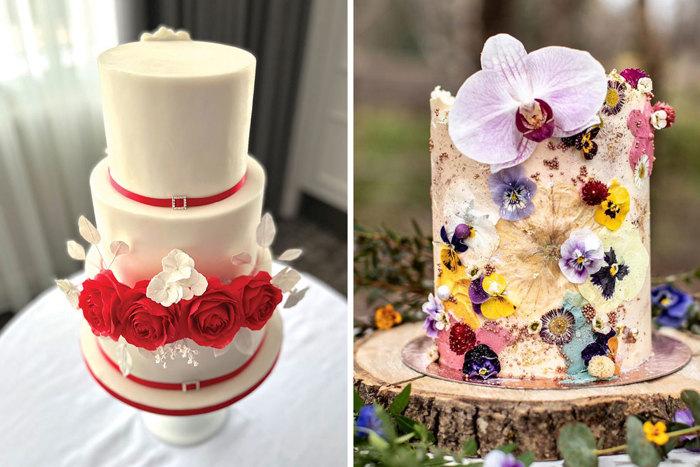Several Scottish wedding bakers reveal how to plan the cake of your dreams, and which questions to ask so it ends in the right kind of tiers

Wedding cakes from The Kilted Cake Company, Pam Rennie Cake Designs and Torta By Katalin
Cutting your wedding cake is a classic photo op and time-honoured tradition of weddings. Whether you choose numerous tiers and white icing or something small and colourful, your cake will be a memorable part of your big day.
No matter the style, your guests can be sure that it’ll be fancier than anything they’d find in the supermarket baked goods aisle – if, that is, you get your timings right. To ensure you don’t end up with a last-minute dash to your local corner shop for eggs, flour and ready-to-roll icing, we’ve had a chat with top bakers to find out all you need to consider in your cake planning timeline.
How much cake do I need at my wedding?
“Generally speaking, I suggest catering for 80% of your guests. This usually means very little cake left over,” Alison McCabe, owner of The Kilted Cake Company, tells us.
When should wedding cake be served?
There are a few times throughout the reception that you can choose to serve your cake. While it’s traditional to cut the cake after all of the speeches and the meal, you can fit this into your day whenever you like.
Alison advises: “If you plan on serving the wedding cake as your dessert, the portion size will have to be bigger. But if you intend to have it at night as part of the evening buffet or even during cocktail hour, the slices can be quite a bit smaller.”

The Kilted Cake Company will work with you to ensure you have the right cake for your wedding (Photo on left: Eliza T Photography)
How many tiers should the cake have?
Once you let your baker know how many guests you’ll be serving, they can factor this into the design process. Alison adds: “If we make each individual tier deeper, you’ll be able to cut more cake for your guests without changing the look or design.”
If you’re looking for more slices without splurging on an extra tier, Alison has a clever trick: “You have the option of ordering what we call ‘sheet cakes’ in addition to your main cake. That way, when your catering staff take the cake away to slice it up, you can be assured there will be enough for everyone – they just won’t know it was already in the kitchen.”
When do I need to arrange my wedding cake?
“Once you’ve secured your venue, you can start booking your other suppliers,” says Pam Rennie, who kicked off her business, Pam Rennie Cake Design, during lockdown. “Even if your wedding is two years away, you can still get ahead and book your baker.”

Three tier wedding cake designs from Pam Rennie
How to choose the right wedding cake maker
Beyond word of mouth, how do you choose a cake-maker? “Have a look around at wedding fairs, open days and on social media to find suppliers who make the style of cake you’re looking for,” Pam says. “Once your date is in my diary, I’ll have you in four to six months prior to your wedding for a consultation where we discuss design, colours and servings.”
Things to consider when choosing your wedding cake
Fellow baker Katalin Urquhart, who runs Torta by Katalin (also set up during lockdown), says asking the right questions early in the process makes it easier in the long-run. “It’s not just the design you need to consider,” she tells us.
“You should be deciding whether you need to serve everyone, if your cake will work for your chosen venue, what sort of budget will suit, and if you want to incorporate elements such as real flowers.” Her approach is to work with the couple, “who 90% of the time will have an idea of what they’d like,” to create something bespoke that will suit their style.
How much should I budget for my wedding cake?
Setting a upper limit and being realistic about what you can afford is one of the most important things you can do, according to Laura Graham of Jappacakes (a nugget of advice that applies to every aspect of wedding planning): “It really comes down to how much of a priority the cake is. If you want it to be a showpiece, you have to devote more of your budget to the cake.”
Being willing to adapt your plans is very helpful when it comes to the design of your cake. “It’s important to have an idea in mind of how flexible you’re willing to be,” Laura explains. “Be upfront with your baker about both your budget and what you want to accomplish, and always choose a cake designer who will work with you to give you the most for your money.”

Torta by Katalin creates unique cake designs for your special day
Wedding cake tastings
“When you book so far in advance, there can obviously be some changes when the big day is fast approaching,” says Katalin. “So after the initial chat, we put things on the back burner for a while until it comes to arranging the tasting. Then, usually about one month before, the design is firmed up and finalised.”
When can I make changes to the design?
If you’re thinking about altering the design, give your baker plenty of notice – some decorations might need a bit more time to organise. “After the consultation, I digitally sketch the cake so the couple can see what it will look like,” Pam tells us. “Designs and other elements can be changed after the initial consultation, but no later than six weeks before. Changes may incur extra costs too, which would be due with the final balance one month before the wedding date.”
Can I swap things out on the wedding cake to save money?
Making some smart swaps can help lower costs without needing to lose any of the dreamy details you’ve had your heart set on.
"Having lots of sugar flowers can add hundreds to the final bill as these take a long time to make and require a lot of skill and expensive equipment. Swapping them for fresh or artificial flowers is a simple way to bring the cost down," adds Laura at Jappacakes.
There’s a common misconception that dummy tiers can reduce costs, but that isn’t necessarily the case.
“We still have to decorate these dummy tiers, which is where most of the cost comes from – it takes a lot of time,” says the baker. “A good-quality, food-contact-safe cake dummy can cost as much as cake ingredients.” The workaround? “A new trend is tier separators – these give your cake extra height for around £50.”
When will the cake arrive?
“I always contact the couple on the week of their wedding to wish them well, advise what time I’ll deliver and set up the cake, and firm up any further details,” says Pam.
Katalin points out that external factors should be considered when deciding on certain design elements. “Edible flowers have a short lifespan, so if you’re going to display your cake for a long time, you may want to choose gumpaste or have replacement decorations on hand,” she suggests. “And if your date is the height of summer, it’s worth asking your baker to deliver as late as possible to ensure the cake is looking its best for photos.”

Three-tier wedding cake from Pam Rennie Cake Designs and floral wedding cake from Torta By Katalin
What to do with the cake after the wedding
It’s a nice idea to keep some cake aside to enjoy, shortly after the big day, or for your anniversary. Alison suggests: “Some of my couples have kept the top tier for themselves. Others want to set aside a bigger tier to be enjoyed with the bridal party the following day.
“Because your cake is baked fresh, you are able to freeze it. Imagine how nice it would be to sit down together one evening after the wedding and look through your photos while enjoying a delicious slice of cake!”
Still to sort your wedding cake? See a range of expert bakers on our directory




